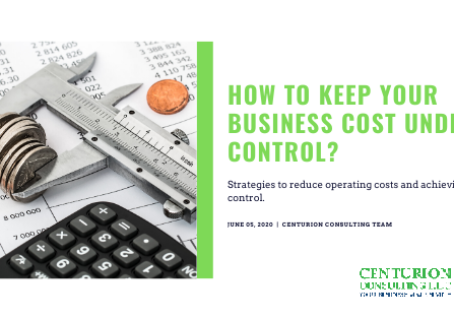What is Cost Control? –
Cost control is the practice of distinguishing and reducing of business expenses to increase profits, and it starts with an effective budgeting process. A business owner compares the company’s actual financial results with the budgeted expectations, and if actual costs are higher than planned, the management has the aggregation it needs to take action.
Cost control helps us to identify those activities that have unreasonable costs and to give an indication of how serious those overruns are. Cost control aims to ensure that resources are used to the best advantage. In these days of ever-increasing costs, the majority of promoters are insisting on projects being designed and executed to give maximum value for money.
It is critical to operate an effective cost control procedure during the design stage or a business planning of a project to keep the total cost of the job within one’s budget. Hiring a virtual CFO services can help in operational efficiency and reduce costs.
The four strategies outlined below are good first steps towards reducing operating expenses and achieving cost control.
Effective Budgeting –
Organizations prepare a financial budget for cash flows management in a better way. This budget gives the business a direction and provides a more efficient planning mechanism to manage the inflows and outflows. To prepare a financial budget, it is important to prepare the operating budget first. With the help of the operating budget, the organization can predict the sales and production expenses. To prepare an effective budget it’s important to consider all departments in the business and the associated costs keeping in mind the market conditions and the market size for your business expected to be in the ensuing year.
Business consultants can provide expert advice on building effective financial budget. It conveys not only the financial aspects of the business but also checks the operational efficiency. In terms of management overview, business consultants always provide an overview at the organization level and enable the organization to consider all aspects while formulating a financial budget for both short term and long term. This can be used as a bench mark to assess and control costs.
Precise Hiring Process –
Taking a detailed approach to all the steps in the hiring process – from recruitment to on boarding – is one of the most important cost control measures. Hiring a perfect fit for the organization structure is highly beneficial for maintaining cost under control. SME’s should integrate hiring potential candidates with multitasking abilities to take up multiple responsibilities. Employees who can’t manage the work demands take heavier toll on a business, much-more than you realize. Poor hiring process can demand more time and more cost consequently affects ROI .
Through either an in-house proper recruitment process or an outsourced recruitment firm, it may be expensive but , once the organization selects the right candidate, it will eventually prove to be a wise, cost-effective decision.
Data Management –
Data management is a key to successful business strategy. Data management enables business leaders to leverage the data they collect from customers and suppliers to propel their growth. Data management makes it more productive, and eventually reduces costs. Your employee won’t waste time searching for data or duplicating efforts.
It’s important to control your data entry point to improve your overall data management, remove irrelevant data, and control the backup and replacement of your data. For most businesses, cloud computing is an excellent way to reduce both capital costs and ongoing expenses. The cloud provides round-the-clock access to business data, and financial software as a service programs can give firms greater flexibility. A better data management can impact your profits over the long term and position your company for success. Data that you are able to retrieve in the least amount of time is time saved and any time saved is costs saved.
Managing Operational Funds –
SME’s should always be looking for ways to reduce their operating costs without sacrificing the quality of their offering. It’s important to hold accountability at all levels so the productivity can be measured vis a vis the costs incurred. At times it makes sense to outsource certain business practices to a third-party specialist than hire a full-time internal resource. For instance, hiring VAT consultant could benefit vis a vis hiring a full-time resource since it would increase your costs of operation. By identifying inefficiencies, and plugging them with productivity measures and processes, you can reduce waste in both materials and time. There are many ways in which you can manage and keep your business costs under control like opting for shared warehouses and storage facilities can help reduce unnecessary expenses. Go through your variable costs and identify services that you’re no longer using. Leasing office space, paying utility costs, and managing a physical office can be a drain on your financial resources. Consider allowing your team to telecommute as a way to reduce total costs. Consider working from home for some cases if possible.
Conclusion: –
It’s clear that cost control plays an integral part in reducing necessary expenses. Not only does this lead to a better understanding of effective methods of cost control but also build awareness and better control over the organization. Learning and implementing this method correctly ultimately leads to lower expenses and higher profits. Additionally, business is less likely suffer with unreasonable cost with
effective budget planning, hiring right people and so on. With better cost management business opportunities will increase leading to generating more income.







